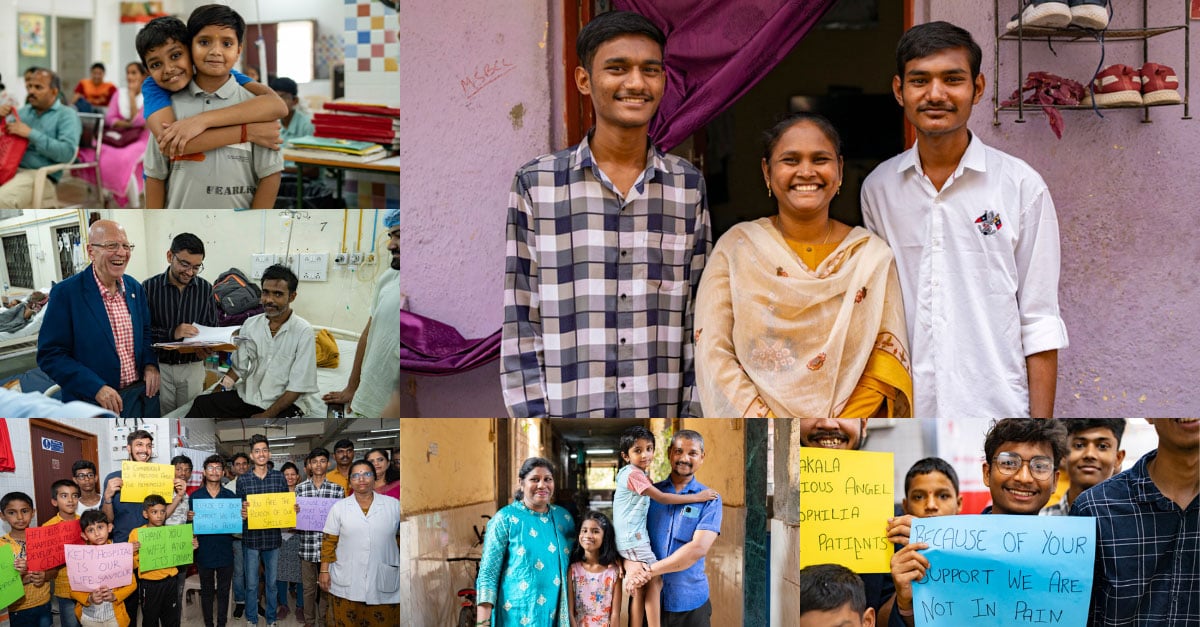The WFH is providing support to India through a comprehensive approach, driven by the WFH Humanitarian Aid Program, the WFH Path to Access to Care and Treatment (PACT) Program, the WFH Twinning Program, the WFH International External Quality Assessment Scheme (IEQAS), and other efforts. Through these activities, the WFH, PWBDs, healthcare professionals and other stakeholders have opportunities to collaborate over the long term to support the local bleeding disorders community.
In 2024, the WFH released three videos showcasing the work being done in India. If you missed them—or if you want to watch them again—read on!
A multifaceted impact in India
Shubhranshu S. Mohanty, MD, of King Edward Memorial Hospital in Mumbai, credits the WFH for making 150 annual surgeries possible in his facility, including complex cases like robot-assisted knee replacements. A standout case is Rahul, a PWBD who—after surgery made possible thanks to donated treatment products—regained his mobility.
To read the article based on this video, click here.
WFH collaboration with Sahyadri Hospital in India bears fruit
Since its founding in 2002, Pune’s Sahyadri Hospital has provided care for people with bleeding disorders, advancing treatment through collaboration and WFH support. Success stories include Mohnish Patil, now walking and studying pain-free, and Om Shah, who regained his mobility and leads an active life. The WFH has also helped the Hemophilia Federation India (HFI) expand to 99 chapters while forging close ties with 120 treatment centres nationwide.
To read the article based on this video, click here.
The WFH and our sponsors: making a difference in India
WFH Humanitarian Aid Program sponsors have helped transform care for India’s bleeding disorders community. Multiple initiatives have made it possible to provide prophylactic treatment, improve diagnostics, and enhance access to care. During a recent visit, sponsors saw first-hand the impact their support has had on the Indian inherited bleeding disorders community, including making prophylaxis a reality, and helping to expand medical infrastructure for diagnosis. After the visit, the sponsors reaffirmed their commitment to the WFH Humanitarian Aid Program.
To read the article based on this video, click here.
Almost 68 million IUs of factor were donated to India through the WFH Humanitarian Aid Program in 2024. Since 2015, almost 439 million IUs of factor have been donated to India. To find out more about the WFH Humanitarian Program, please click here.
About the WFH Humanitarian Aid Program
The WFH Humanitarian Aid Program improves the lack of access to care and treatment by providing much-needed support for people with inherited bleeding disorders in developing countries. By providing patients with a more predictable and sustainable flow of humanitarian aid donations, the WFH Humanitarian Aid Program makes it possible for patients to receive consistent and reliable access to treatment and care. None of this would be possible without the generous support of Sanofi and Sobi, our Founding Visionary Contributors; Bayer, CSL Behring and Roche, our Visionary Contributors; Grifols, our Leadership Contributor; and Takeda, our Contributor. To learn more about the WFH Humanitarian Aid Program, visit www.treatmentforall.org.













